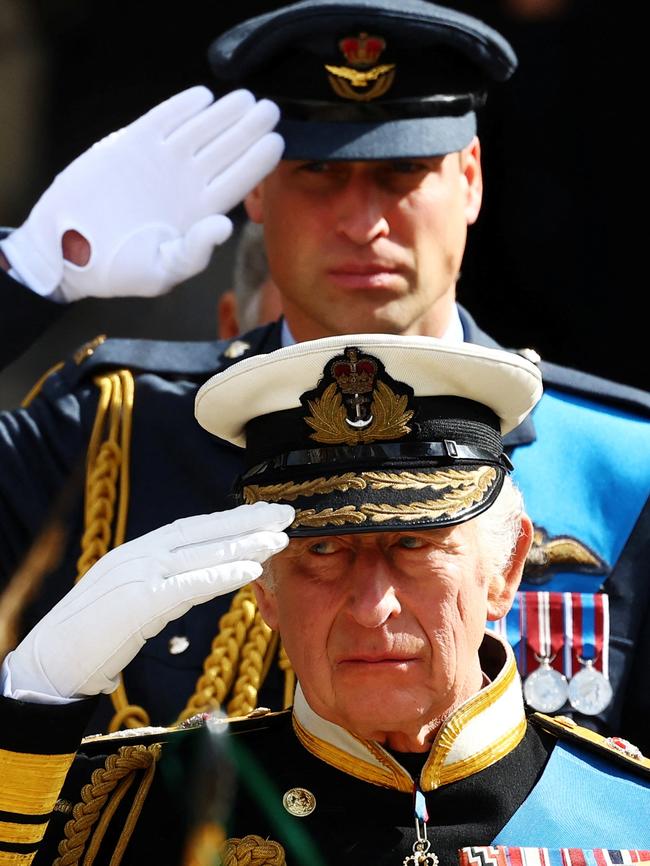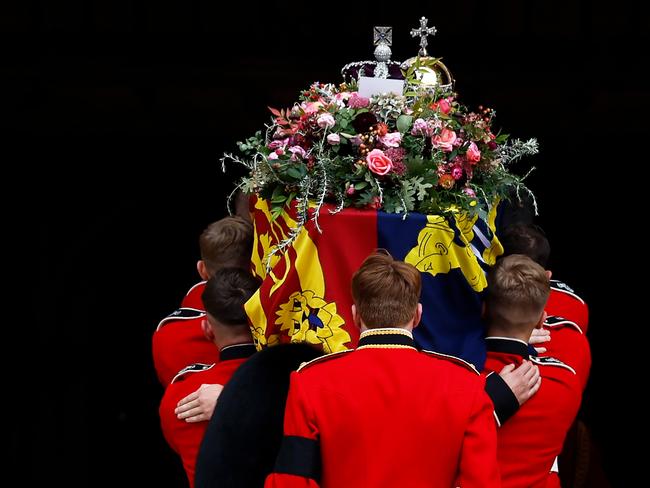Australia’s new monarch won’t change country’s attitude towards a republic
After the mass displays of respect and affection that we’ve all witnessed for the Queen, why would anyone want a republic with a power-grabbing president at the apex of our system, writes Peta Credlin.
Opinion
Don't miss out on the headlines from Opinion. Followed categories will be added to My News.
It wasn’t so long ago that activists said that Australia had to become a republic to demonstrate our maturity and independence as a nation.
But now, as we saw on Thursday, with the flag-burning protests in several of our cities on the Queen’s Day of Mourning, a republic is supposedly needed in order to reject racism and colonialism.
My guess is that voters unconvinced by Paul Keating’s brand of republicanism two decades back are even less likely to embrace Adam Bandt and Lydia Thorpe’s brand of republicanism in a few years’ time.
Indeed, now that millions of us have had a reminder of the Crown’s seamless transition from mother to son, the uplifting ritual and ceremony associated with the monarchy, and the servant leadership that the royal family has provided for generations, the real question is whether the Albanese government will persist in its plans for another republican referendum in any second term.
After the mass displays of respect and affection that we’ve all witnessed from Britain – as well as here in Australia – over the past fortnight, why would anyone want a dreary republic with some self-important nonentity or power-grabbing president at the apex of our system, rather than a distinguished Australian governor-general representing a universally respected monarch?

How would a president picked like a politician give us a better system of government or make us a more self-respecting country? As always, the challenge for the republican elites is to convince ordinary Australians that what they’re pushing is better than what we have.
And, thankfully, most ordinary Australians retain a healthy scepticism at being told what to think, even in these times.
Having been on the ground in London over the past fortnight covering the Queen’s funeral for Sky News, no one should underestimate the deep feelings brought on by her death and the smooth and gracious manner of the new King’s accession.
What struck me, as I watched moving ceremonies play out, was the power of people’s attachment to not just a monarch but an institution.
As I’ve said before, the Crown is bigger than the individual that wears it and that’s what hit home to so many as they watched a mortal woman pass away but an institution, bolstered by succession, renew itself.
I spent time walking around the floral tributes, laid out in the park next to our broadcasting set-up at the front of Buckingham Palace, and the cards and messages left me in tears.
I’ve never been as moved as I read heartfelt, handwritten notes from a grateful people who were unashamed to openly reference ‘God’, ‘heaven’ and other Christian language in a world that’s increasingly secular.
For me, what stood out amid all the fine words and the pomp were the inscriptions of the everyday people on the tributes they’d left for her.
“You have been the quiet among the chaos, and the constant in the last 70 years when things haven’t always gone our way,” said one.
“Thank you for your enduring service, your counsel and your ability to read the mood of the nation,” read another.
Another said: “Your Majesty, you never let us down, thank you.”
And on they went. Beautiful messages from children, drawings of corgis and Paddington Bear, even marmalade sandwiches wrapped in Glad Wrap for her handbag.
Wandering the park with me were hundreds and hundreds of young people, dogs and older people too. But so many 15-35 year olds that republicans want us to believe reject the idea of a monarchy. With my own eyes, that’s not what I saw.

It was an incredibly multicultural crowd too, another one of the myths from those who want to style the Crown as a white vestige of the past.
This was no standard civic event or sudden convulsion of feeling but a sustained mass movement where people felt they were making history and in some almost-mystical way joining themselves to the life of the nation.
Then there was the most watched Christian church service of all time. An hour of beauty and simplicity in which, for once, the Archbishop of Canterbury and assorted prelates managed to preach faith rather than social justice or climate – extolling the faithfulness of a great Queen who was also a humble servant of God.
Naturally, we’ll all move on to the pressing concerns of the times ahead. But this has been one of those moments in time that should leave us all lifted and stand as a reminder that we should guard institutions that have stood the test of time and be slow to discard the cloak of history.
ENERGY CRISIS DESTINED TO HIT HOMES
Having spent five of the past six weeks in Europe, I can assure you that – the Queen’s ceremonies aside – all anyone was talking about on the street is the energy crisis – will the heaters stay on and how much will it cost to get through this winter?
With upwards of 30 per cent of its power now coming from wind and solar, and with green mania preventing extra local gas extraction, Europe is dependent on Russian gas to keep the lights on when the wind doesn’t blow and the sun can’t shine.
And thanks to the Ukraine war, that’s more expensive than ever and entirely dependent on the caprice of the Russian dictator.
Having metaphorically watched the cars on the road ahead run off the bridge, you’d think, wouldn’t you, that here in Australia we’d stop and back up.
But no, thanks to this month’s passage through the parliament of the legislatively mandated 43 per cent emissions cut by 2030, we’re now required by LAW to have upwards of 80 per cent of our power from renewables within just eight years.
Even though 60 per cent of our electricity currently comes from coal-fired power stations that can’t readily be powered up and down as the weather changes and new gas exploration and extraction is almost impossible thanks to bans and activist lawfare.
And thanks to woke shareholders, the Liddell coal-fired power station currently producing about 10 per cent of NSW’s power will close next year and the Eraring plant, producing 20 per cent, will close in three years’ time.
“Don’t worry”, say billionaire investors, “green hydrogen will save us”. Even though people like Elon Musk warn it’s all a green pipe dream.
And with governments now subsidising electric cars, as well as renewable power generation, we can expect electricity demand to be going up and up, just when reliability and affordability is going down and down.
Does any of this make sense? Of course not, but it seems that none of our leaders want to call out the coming policy-induced crisis lest it upset Teal voters.
Eventually, hard facts will trump green theory – the pity is that only bitter experience will change some people’s minds.
WATCH PETA ON CREDLIN ON SKY NEWS, WEEKNIGHTS AT 6PM





